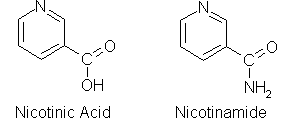Niacin, also known as nicotinic acid or vitamin B3, is a water-soluble vitamin whose derivatives such as NADH play essential roles in energy metabolism in the living cell. The designation vitamin B3 also includes the amide form, nicotinamide or niacinamide. Severe lack of niacin causes the deficiency disease pellagra, whereas a mild deficiency slows down the metabolism, which in turn decreases cold tolerance and is a potential contributing factor towards obesity.
The name niacin derives from nicotinic acid + in. When the properties of niacin were discovered, it was thought prudent to choose a common name other than nicotinic acid, for fear that it might be confused with nicotine, leading to the ideas that either smoking provided vitamins or that wholesome food contained a poison.

Nicotinic acid reacts with hemoglobin and myoglobin in meat to form a brightly coloured complex, and thus has been used as a food additive, typically to improve the colour of minced (ground) meat. However, sometimes excess niacin is added to the meat during processing. Though still licensed as a food colouring agent in some countries, it is not licensed as such in Europe.
The body can synthesize niacin from the essential amino acid tryptophan, but the synthesis is extremely slow; 60 mg of tryptophan are required to make one milligram of niacin. For this reason, eating lots of tryptophan is not an adequate substitute for consuming niacin. As serotonin synthesis is reliant on tryptophan availablity, inadequate dietary intake of vitamin B3 may also therefore lead to depression.
Because niacin in large quantities is a vasodilator, large doses of niacin (either from vitamin B3 tablets or from treated meats) may cause harmless and short-lived but unpleasant symptoms such as extreme skin flushing resembling a sunburn, itching, gastric disturbances, and lowering of blood pressure. The amide form (strictly speaking a provitamin) does not cause these side effects, but is also not as easily assimilated by the body.
Large doses of niacin are sometimes prescribed to combat high blood pressure, and also to lower blood cholesterol levels.
Vitamin B3 has also been used to treat schizophrenia and other mental illnesses by orthomolecular practitioners. Usually the nicotinamide form is used, as it is considered to be more effective.

